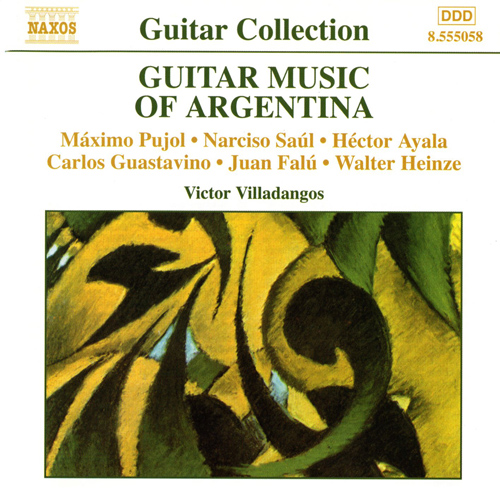"Guitarist Victor Villadangos is excellent. His tone is clear, his playing clean, and as a native of Buenos Aires he has a natural feel for this music."
This is Victor Villadangos’s first recording for Naxos and I hope it is not the last as we are treated to some beautifully clear articulated playing that extracts just the right nuances from this music of the Argentine.
Most of the pieces are new to me, although I am familiar with the "Serie Americana" of Hector Ayala, firstly through an early vinyl recording by Narciso Yepes and recently on CD by Eleftheria Kotzia. This rendition by Victor Villadangos, with its firm rhythms and fine clarity, is, I feel, the superior version.
I well remember Jason Vieaux’s playing three of Pujol’s "Cinco Preludios" (Naxos 8.553449), which was the first time I encountered the name of Máximo Diego Pujol, and thinking what striking music it was. I was not surprised to learn that he has won a number of competitions for composition. With his pieces on this disc he can only justify that status. However, the two composers that I have mentioned do not stand alone here. All the music is of the highest standard and if you enjoy the music of South America and that of Argentina in particular this disc is for you. A bargain at twice the price.
"A charming programme elegantly played. Argentina has produced many fine guitarists, as notable for their performance of European music as of that of their own country. Victor Villadangos' reputation rests thus far on the latter... Villadangos is a refined player in every good sense and his avoidance of 'folksy' roughness works in the music's favor. Recording quality and annotation (provided largely by the composers themselves) is excellent."
There are two ways of listening to music. One, of course, is the dinner party method, basically unnoticed unless the conversation deadens and then the music can open up a new topic. The second is to listen with the CD booklet open carefully following the action, as it were. This CD can offer you both experiences and is therefore of doubly good value.
Argentinian music is proving quite popular nowadays. Factors have been the discovery of Astor Piazzolla just after his death in the early 90s, the burgeoning appeal of Ginastera and now the discovery of these composers and others thanks to companies like Marco Polo, ASV and Naxos. The music is certainly worthy of attention and has the unique and uncanny knack of both being serious in intent and enjoyable to everyman at the same time. This is the perfect balance of the serious and the popular, as this recording demonstrates.
The national music of Argentina is the Tango and it appears in several forms with several names. Many are represented on this CD, sometimes in suites of pieces using the national rhythms of the country and sometimes in Sonatas. Pujol’s Suite has a Tango as its second movement. ‘Del Plata’ means from the river Plate Basin of Buenos Aires and Pujol is using dance rhythms from that area. The longest piece of the disc, Ayala’s ‘Serie Americana’ uses dance rhythms from six South American countries - for example the last one Gato y malambo from Peru.
The regular guitarist's technique of striking the body of the instrument to gain a percussive effect but with chordal overtones is a delightful characteristic of certain pieces especially those where the rhythm dominates, as in Saul’s intriguing ‘Boulevard
Victor Villadongos contributes a brief paragraph to the booklet that I should quote. He writes "The works here included are an expression of the diversity of the genres extant in the republic of Argentina, not folk music, but reflections of a unity in cultural diversity."
The back of the disc tells us ‘the recording brings together pieces written … by the most eminent contemporary composers of Argentina’, indeed the booklet notes inside, so well researched by Keith Anderson give biographical detail on each of them as well as background on the music itself.
Vincent Villadongas has an exemplary pedigree particularly throughout South America and plays not only with virtuosity, which is necessary, but also with a natural musicality and elegant sense of phrasing. The recording is close but not oppressive and although recorded in a church there is no cavernous acoustic.































